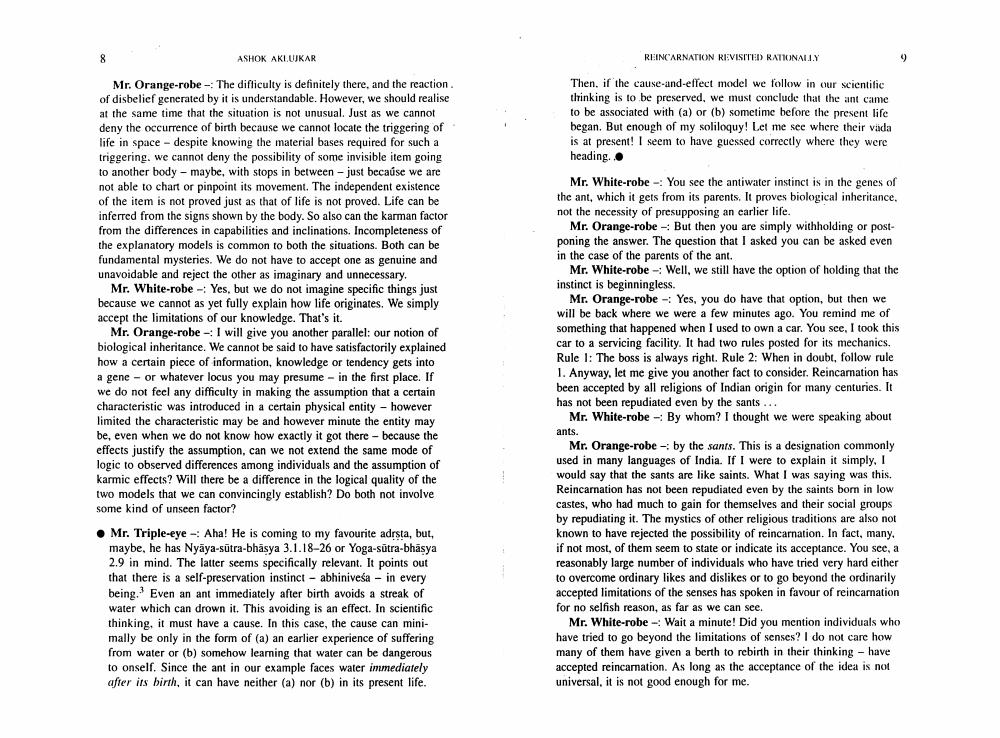Book Title: Reincarnation Revisited Rationally Author(s): Ashok Aklujkar Publisher: Ashok Aklujkar View full book textPage 4
________________ 8 ASHOK AKLUJKAR Mr. Orange-robe -: The difficulty is definitely there, and the reaction. of disbelief generated by it is understandable. However, we should realise at the same time that the situation is not unusual. Just as we cannot deny the occurrence of birth because we cannot locate the triggering of life in space despite knowing the material bases required for such a triggering, we cannot deny the possibility of some invisible item going to another body maybe, with stops in between - just because we are not able to chart or pinpoint its movement. The independent existence of the item is not proved just as that of life is not proved. Life can be inferred from the signs shown by the body. So also can the karman factor from the differences in capabilities and inclinations. Incompleteness of the explanatory models is common to both the situations. Both can be fundamental mysteries. We do not have to accept one as genuine and unavoidable and reject the other as imaginary and unnecessary. Mr. White-robe: Yes, but we do not imagine specific things just because we cannot as yet fully explain how life originates. We simply accept the limitations of our knowledge. That's it. Mr. Orange-robe: I will give you another parallel: our notion of biological inheritance. We cannot be said to have satisfactorily explained how a certain piece of information, knowledge or tendency gets into a gene- or whatever locus you may presume - in the first place. If we do not feel any difficulty in making the assumption that a certain characteristic was introduced in a certain physical entity - however limited the characteristic may be and however minute the entity may be, even when we do not know how exactly it got there because the effects justify the assumption, can we not extend the same mode of logic to observed differences among individuals and the assumption of karmic effects? Will there be a difference in the logical quality of the two models that we can convincingly establish? Do both not involve some kind of unseen factor? Mr. Triple-eye-: Aha! He is coming to my favourite adṛsta, but, maybe, he has Nyaya-sūtra-bhāṣya 3.1.18-26 or Yoga-sutra-bhāṣya 2.9 in mind. The latter seems specifically relevant. It points out that there is a self-preservation instinct abhiniveśa in every being. Even an ant immediately after birth avoids a streak of water which can drown it. This avoiding is an effect. In scientific thinking, it must have a cause. In this case, the cause can minimally be only in the form of (a) an earlier experience of suffering from water or (b) somehow learning that water can be dangerous to onself. Since the ant in our example faces water immediately after its birth, it can have neither (a) nor (b) in its present life. REINCARNATION REVISITED RATIONALLY Then, if the cause-and-effect model we follow in our scientific thinking is to be preserved, we must conclude that the ant came to be associated with (a) or (b) sometime before the present life began. But enough of my soliloquy! Let me see where their vada is at present! I seem to have guessed correctly where they were heading.. Mr. White-robe: You see the antiwater instinct is in the genes of the ant, which it gets from its parents. It proves biological inheritance, not the necessity of presupposing an earlier life. Mr. Orange-robe: But then you are simply withholding or postponing the answer. The question that I asked you can be asked even in the case of the parents of the ant. Mr. White-robe: Well, we still have the option of holding that the instinct is beginningless. Mr. Orange-robe: Yes, you do have that option, but then we will be back where we were a few minutes ago. You remind me of something that happened when I used to own a car. You see, I took this car to a servicing facility. It had two rules posted for its mechanics. Rule 1: The boss is always right. Rule 2: When in doubt, follow rule 1. Anyway, let me give you another fact to consider. Reincarnation has been accepted by all religions of Indian origin for many centuries. It has not been repudiated even by the sants... Mr. White-robe: By whom? I thought we were speaking about ants. Mr. Orange-robe; by the sants. This is a designation commonly used in many languages of India. If I were to explain it simply, I would say that the sants are like saints. What I was saying was this. Reincarnation has not been repudiated even by the saints born in low castes, who had much to gain for themselves and their social groups by repudiating it. The mystics of other religious traditions are also not known to have rejected the possibility of reincarnation. In fact, many. if not most, of them seem to state or indicate its acceptance. You see, a reasonably large number of individuals who have tried very hard either to overcome ordinary likes and dislikes or to go beyond the ordinarily accepted limitations of the senses has spoken in favour of reincarnation for no selfish reason, as far as we can see. Mr. White-robe: Wait a minute! Did you mention individuals who have tried to go beyond the limitations of senses? I do not care how many of them have given a berth to rebirth in their thinking - have accepted reincarnation. As long as the acceptance of the idea is not universal, it is not good enough for me.Page Navigation
1 2 3 4 5 6 7
